#programming langauges
Explore tagged Tumblr posts
Text
December 14th, 2024

Day 9/150 Days of Growth
Had a quiet study day at a medical library today. I did some Azure exam prep and then spent the rest of the day coding + watching some House MD. I picked up some new books including "unlimited memory" and an official GMAT guide I'll be doing only a section every day (slow, but steady). Also rewarded myself with this Krispy Kreme tumbler which is already SO useful. What I got done today: ✒️ Finished the current section of Azure exam prep ✒️ Completed my first ever assignment in Azure ✒️ Mapped out how to fix my portfolio in Python ✒️ Some LeetCode questions ✒️ Completed 2 parts of my CS50 assignment ✒️ 20 minutes of GMAT math review
Playlist of the day:
youtube
#study blog#studyspo#daily journal#study motivation#studyblr#dark academia#light academia#to do list#coding#langauge learning#realistic studyblr#gmat prep classes#programming#software engineering#microsoft azure#chaotic academia#academic weapon#dark academic aesthetic#chaotic academic aesthetic#academic validation#journaling
15 notes
·
View notes
Text
Desperately want to read alien romance, but I don't want to read anything about breeding programs.
I know what I want is out there, but . . . .
#i want . . . like the sci fi equivalent of romantasy i think#intergalactic space adventures but also a heavy romantic subplot between a Plucky Human Adventurer and alien crewmember or alien villain#preferably not a shadow daddy trope though i can't take those guys seriously#i can't find anything that isn't 'so and so joins this program to go be an alien's surrogate and falls in love'#or 'so and so is kidnapped to be in a program to provide alien babies'#i COULD go for some 'we don't speak each other's langauge and you can't even vocalize half my language's vowels' tho#i don't really want fated mates either which makes it even harder.
2 notes
·
View notes
Text

Top 8 Things to Know About the Python Programming Language
Discover the top 8 things to know about the Python programming language in this quick guide. Python is a beginner-friendly, high-level language known for its clean syntax and powerful versatility. It’s used across industries for web development, data science, automation, AI, and more. With strong community support and an extensive library ecosystem, Python helps developers build efficient, scalable applications. Whether you're just starting out or advancing your career, Python remains a future-proof and in-demand programming skill for modern tech development.
0 notes
Note
yoooo anaxa and the herta with a reader who is fluent in 3-4 languages? like they use a main 1 to communicate with them but occasionally the characters catch reader muttering something they dont understand. i feel like reader's langauge settings on thier pc/phone will be different (might even read other books in their other languages
awesome!!

-anaxagoras is of course delighted to have such a multilingual partner; though language studies aren't his primary field, he's also someone who would find it interesting and at least look into learning another language or two himself, maybe dabbling in several amphorean dialects just to learn about different grammar structures and sentence constructions. if he is to spread knowledge to the world, he understands that becoming familiar with different modes of communication is necessary. if you ever want to talk about your studies, he's open to discussion. you might teach each other something new!
-when he hears you speaking to yourself in a different language, he listens closely to see what he can glean from your mutterings even if he can't understand you. he lets you have your secrets but he is also deeply curious. could it be that some languages are more useful for expressing your thoughts than others? or is it that some things can only be conveyed in different words? he wants to know if you'll tell him.
-he's fascinated when he glances over at your phone and notices that it's in a completely different language than you normally use. he likes that you're such a varied person and would never want to limit you to just one language if four is suitable. if he finds interesting books or articles in a language that you speak, he'll share them with you in hopes that you'll find it enlightening. the fact that there are things in this world he can't understand isn't a downside to him but a reminder that he has yet more to learn, and he heartily cherishes that notion.

-herta may sometimes take intellectual talents for granted as the genius she is, but make no mistake she is still impressed by your dedication to language studies. it's one thing to be smart and another to have the means to communicate it with! she might even goad you into learning more languages just for fun. after all, why content yourself with three or four when you could keep going? she doesn't doubt that you have the brains to do it.
-i'd bet anything that herta has a puppet who's programmed to speak basically any known language in the universe. if you ever have a need to chat when no one's around you at least have a little puppet friend to bounce ideas off of. she'll think it's very funny if you sit down and have a conversation with it.
-this does mean that some of your notes or favorite books are inaccessible to her without a translating application (which she surely has), but she takes this in stride and only complains a little when there's a fascinating article or a clever joke she can't grasp the nuances of. she's more interested in science and technology than anything else, so she's not especially keen on learning more languages herself, but she will remember what you tell her if you try to teach her a little bit. if something has to do with you, it becomes interesting to her! i think it would also be fun to read to her in a different language. even if she doesn't understand it, she can appreciate the beauty of your voice pronouncing sounds unfamiliar to her.
#hsr reader insert#hsr x reader#imagines#requests#anaxa x reader#herta x reader#i like this subsection of fans who are both herta and anaxagoras likers it makes a lot of sense to me#my apologies if this is short i was a little stumped and didn't want to leave this sitting for too long <(_ _)>
37 notes
·
View notes
Text
I keep seeing people wondering why Jor-El's AI wasn't programmed to anticipate a langauge barrier and Clark not speaking Kryptonese.
Here's why this isn't a plot-hole or an oversight or anything like that.
Clark's bio-cousin Kara Zor-El is listed in the cast of characters over on wikipedia with a voice actor, meaning she's slated to appear sometime in season 1.
In nearly all portrayals, Kara is older than Clark, being in her young-to-mid teens when Krypton went kaboom. But shenanigans happen and she arrives on Earth still the same age as when she left Krypton and Clark is already an adult. In the 2015 Supergirl series, Kara was supposed to arrive on Earth alongside Clark and help raise him (obviously, that didn't happen).
HOWEVER, if the MAWS writers borrowed that aspect from 2015 Supergirl, then Jor-El really did expect Clark to know Kryptonese because Kara would have taught her cousin the language. What he didn't anticipate was Kara never arriving.
#so the ai is extra sad bc kara isn't there#and clark has no connection whatsoever#my adventures with superman
717 notes
·
View notes
Text
PROGRAMMING QUESTION
hey i got a question about programming languages that i feel like is a very stupid question but i wanna ask it anyway is there a reason besides "easier to learn/more classes available/ect" that most consumer programs/devices/games tend to be written in JS, Python or likewise? Like, I don't know what the actual amounts are for how many things are programmed in what languages, I just feel like most things are programmed in "The Popular Langauges" I feel like I never see a software or device or anything that's just programmed in C (or children) and I've definitely not seen something programmed in Rust in a very long time Maybe i'm just dumb and I don't know how things outside my very limited perspective get coded and I just need a reality check but theoretically nothing is stopping a big company from programming their next touch-screen control panel thing in C, right?
#i'm not counting HTML or CSS#those are style only#i know this is very vauge#look i'm running on several days no sleep#programming#coding#software#javascript#python#c sharp
22 notes
·
View notes
Text
when it comes to funny keywords i always remember this one programming language from the 60s i heard about called "Langauge H" where programs start with "CHAPTER 1" and end with "OBEY" that i had to do a silly amount of research to confirm was not just made up
32 notes
·
View notes
Note
Hello!
Checking out your blog, I noticed that you use C++ and seem quite knowledgeable on it, so I wanted to ask for your help (if it doesn't bother you!).
I've completed the two C++ courses in SoloLearn (which are quite superficial, but serve as good introductions, I believe), and I'm currently reading "The C++ Programming Language", by Bjarne Stroustrup. My issue is that I'm a bit afraid of not really understanding anything and/or being unable to write any functional code by myself. Therefore, I wanted to ask if you had any resources and/or tips that could be helpful for a beginner like me (the only language I've ever used before is HTML, and so I thought it was a good idea to go straight to C++ for the challenge of it xd).
It NEVER bothers me to blabber about code! :D
I LOVE C++
So first a long rant, and then my answer :3
C++ will probably forever be my favorite langauge.
But many do not like it, and it is actually somewhat rare to see as a language a professional uses.
Why? Because one should use a language for what it is good at.
And what is C++ good at?
Well, one of its neatest features is that it is a object oriented language.
It is also a language where you can create objects, but the language ITSELF is object oriented.
C++ is a derived class of the baseclass C
And it have the same philosophy as C
You can do ANYTHING!
You can EASILY write garanteed memory safe code in C++
You can write psydocode that have the same safety garantees as Rust.
Or you can go for 100% performsnce, dancing with void pointers and GOTOs!
Craft a class so it gets build, moved, removed used and works EXACTLY how you want it to! Down to the smallest details!
Write halfway object oriented and half functional!
If it can be done on a computer, it can be done in C++!
It may not be the language most often used. Often there are better languages for creating things
But knowing C++ means that you never again have to fully learn another language.
A C++ programmer KNOWS what a computer can do, so it is just a question of googeling the syntax for whatever language we are writing it in that day :D
Rant over. Answer time! :D
When I have to get a bit familiar with a new language I usually build a HTTP server :3
It is easy enough to look up for help, it means you work with everything you know
Slap it on a raspberry pie 0 or 3 depending on your wallet and bam! You have your own fileserver! :D
Connect a SSD into the raspberry pie 3 and bam, you now have your own cloud storage! :D
That is ALWAYS a useful thing :3
Keep it on your own network with a passwork and use MDNS to use it and it is 100% safe.
Because you piggybag on all the security wirless networks come with these days :3
8 notes
·
View notes
Note
How do universal translators affect music with lyrics? Do they try to translate everything and completely ruin the sound of it? Or are they sufficiently advanced to recreate songs in every language?
Universal Translators are quite amazing prices of technology and will use langauge of the listener to translate what they are hearing. Even if that's not a 1 to 1 translation.
Problem is, the words don't sound the same. English for Apple and Esquinine for Apple are two very separate sounds.
When listening to a song not written in Galactic Common, while the tune will sound lovely, the words and phrases of the song won't match the beat or tune.
More than once have songs finished, and the translated lyrics are continued until long after the final note.
Generally, during concerts not written in Galactic Common, translators are temporarily disabled and the programs handed out to the audience will have the written translation, rather than ruin the experience.
Species specific music is more of an experience for an alien listener, rather than a story.
52 notes
·
View notes
Text
Say, for the sake of argument, you want to make a bad programming language. Why would you do this?
Well, for instance, you might get your hands on a book of scripts to generate ephemera for celestial events, only to find out it was written for Microsoft QuickBasic for Macintosh System 7. You quickly discover that this particular flavor of BASIC has no modern interpreter, and the best you can do is an emulator for System 7 where you have to mount 8 virtual floppy disks into your virtual system.
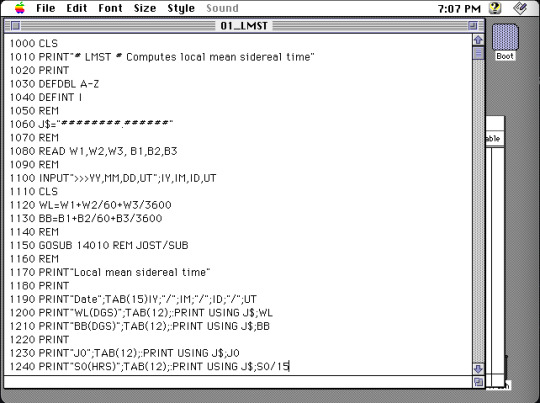
You could simply port all the scripts to another BASIC, but at that point you might as well just port them to another langauge entirely, a modern language.
Except QuickBasic had some funky data types. And the scripts assume a 16-bit integer, taking advantage of the foibles of bitfutzery before converting numbers into decimal format. BASIC is very particular -- as many old languages are -- about whitespace.
In addition to all this, BASIC programs are not structured as modern programs. It's structured to be written in ed, one line at a time, typing in a numbered index followed by the command. There are no scopes. There are no lifetimes. It's just a loose collection of lines that are hopefully in a logical order.
So sure, I could port all these programs. But I'm sure to make mistakes.
Wouldn't it just be easier, some basal part of my brain says, to write your own language that some some modern ameneties, that you compile for your own laptop, that kind of acts like BASIC? A language where you just have to translate particular grammar, and not the whole structure of the program?
Of course it's not easier. But I'm already too far in to quit now.
Memory
Who doesn't love manual memory layout?
In QuickBasic, memory is "kind of" manual. The DEFINT and DEFDBL keywords let you magically instantiate types based on their first letter. I don't know how you deallocate things, because all the scripts in this book finish quickly and don't hang around to leak a lot.
In QuickBasic, this looks like

I guess that the second statement just overrides the first.
There is no stack in a BASIC program, so there will be no stack in my language. Instead you just give names to locations.

creates a symbol named age and makes it refer to 0x1F. The pointer operator should be obvious, and the walrus means we're defining a symbol (to be replaced like a macro), not doing a value assignment during the execution of the program. Now we can assign a value.
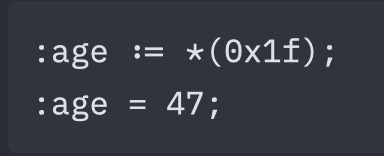
Atoms infer types. age knows it's an int.
You cannot assign a new type to an atom.
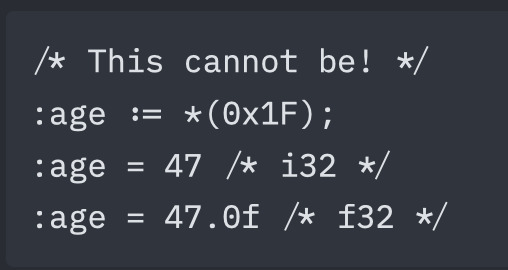
However, you can cast between types by creating two atoms at the same address, typed differently.
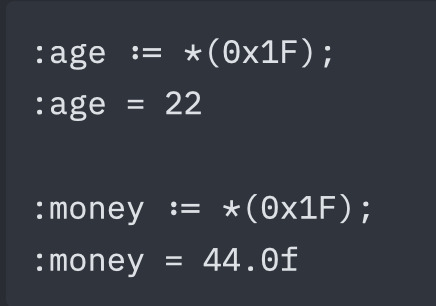
The language does not convert these, it simply interprets the bits as the type demands.
Larger types
Not all types are a single word. Therefore, you can use the range operator .. to refer to a range of addresses.

Note that strings are stored with an extra byte for its length, instead of null-terminating it. Assignment of a string that is too long will result in a compilation error.
Next and Auto
There are also two keywords to make the layout of memory easier. The first is :next which will place the span in the next available contiguous location that is large enough to hold the size required. The second is :auto. For all :auto instances, the compiler will collect all these and attempt to place them in an intelligent free location. :auto prefers to align large structs with 64-word blocks, and fills in smaller blocks near other variables that are used in the same code blocks.
String Allocation
Strings come with a macro to help automatically build out the space required:

This is equivalent to:

That is, a string with capacity 5, a current size of 0, and zeroes (null char) in all spots. This helps avoid memory reuse attacks. ZBASIC is not a secure language, but this is still good practice.
There is also another macro that is similar to a "string literal".

Verbose and annoying! Just like BASIC.
Array Allocation
Likewise, arrays have a similar macro:

Which expands in a similar way as strings, with a capacity word and size word. The difference here is that the type given may change the actual size of the allocation. Giving a type that is larger than a single word will result in a larger array. For instance, f64 takes up two words some systems, so array::empty!(5, f64) will allocate 10 words in that case (5 * 2). Larger structs will likewise take up even more space. Again, all this memory will be zeroed out.
Allocation order
As an overview, this is the order that memory is assigned during compilation:
Manual Locations -> Next -> Auto
Manual locations are disqualified from eligibility for the Next and Auto phases, so a manual location will never accidentally reference any data allocated through :next or :auto.
Here is an example:
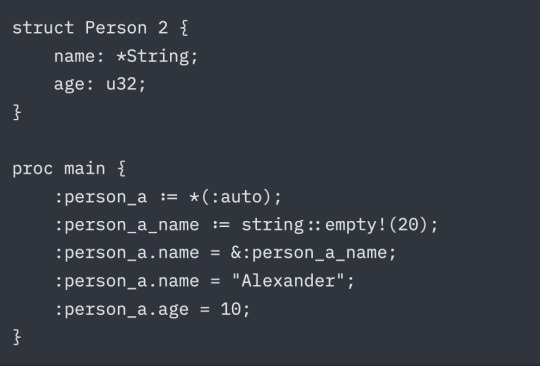
This produces the initial layout:

Which, after the code is run, results in the memory values:

Note that types are not preserved at runtime. They are displayed in the table as they are for convenience. When you use commands like "print" that operate differently on different types, they will be replaced with one of several instructions that interpret that memory as the type it was at compile-time.
Truly awful, isn't it?
3 notes
·
View notes
Note
just dropping by to say how much i love your jacegan fic 🥺 i want to start writing my own fic but i've tried and every time i lose interest and finish it. i love how you give us such quick updates with barely any typos and a clean structure. what's your secret? do you use any tools like ai to write so fast? thank you!
Oh wow, first of all, thank you for the compliment! Second of all, do not, and I mean DO NOT, for any purpose use chatgpt, character.ai, or any large langauge models for your writing — just don't. It won't help your writing, it won't help you as a writer, and it won't help anyone alse.
To answer the question, I guess I'm a relatively quick writer because I've been writing for years and years now outside of fanfiction, so I have a process and the habit down pat, honed from creative writing workshops and the more rigid process of academic writing. With the process I have, half the entire project is basically done even before I post the first chapter.
My approach to writing is very similar to how most people draw and make visual art. You start with a rough and vague outline and then add the details in later steps. Outlining is a learned skill. For fanfiction, most free-write their work, but if I actually intend to finish anything more than 10k+ words, I need to have a plan and know where I'm heading. I really do recommend at least learning to outline, even if you are an intuitive writer who will end up mostly ignoring it.
Here's a rundown of my "steps" with examples taken from my current fic and a project that's still in the planning stages that I may or may not write:
#1: Outline the whole project
Plot the fic chapter by chapter, centering each chapter around one major event or info reveal. You can be as vague and messy as you want for this step since you're the only one who'll get to see your outline anyway.
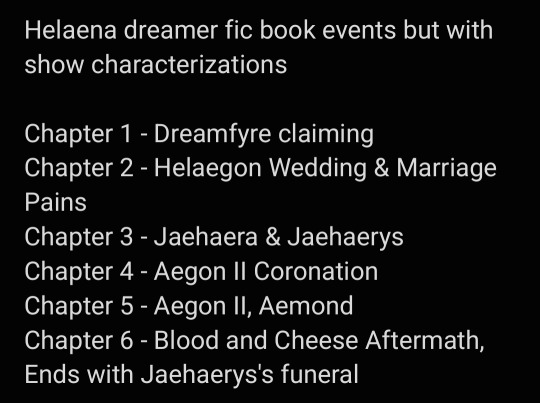
#2: Outline the scenes you want per chapter
You don't need to list everything that'll happen at this stage. These are the key scenes that you daydream about while listening to music or taking a walk. You can picture these scenes on vivid 4k.
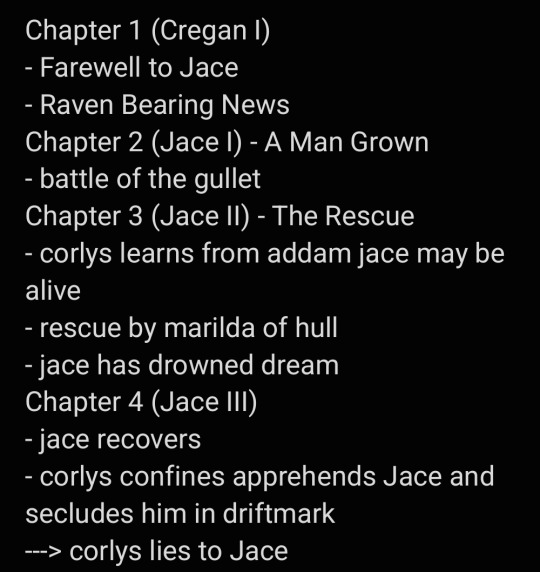
#3: Write summaries of each scene
I put each chapter into a seperate document with their key scenes already there. Here's the phase where you just start telling yourself the story. Again, this isn't meant to be read and seen by anyone but you. The goal is just to know how the events are connected and will play out. This is also the part where I do most of my research.
For example, under Chapter 4 - Jace Recovers, I wrote:
Jace wakes up in Driftmark/High Tide. Body aching, barely can move. [Research here how long it takes to heal from broken arm and medieval casts.] Sees himself in the mirror for the first time and doesn't recognize himself. Has as existential crisis but because he's Jace, he channels the dread into wanting to keep fighting.
This is very short since it's a scene with no dialogue, just one character, and just one major plot point. Some of my summaries are 10x longer, especially for things like trials, small council scenes, battles, and other big events.
#4: Actually start writing the prose
Because you've done step #3, you won't be staring at a blank document and actually know how everything will play out. Without having to worry about plot consistency or inaccuracies since you've ironed that out in the previous step, you can focus on just making these things sound evocative or beautiful or punchy or comforting or angsty or whatever mood you want to communicate with your prose. The summary that was 55 words ended up being 750+ words after this step, and I breezed through it in one sitting.
#5: Plug the prose into a text-to-speech program
I don't have a beta-reader so this is basically my beta-reading step. There are plenty of free TTS apps out there and any of them will do. The goal here is to catch typos, see which lines sound clunky, repetitive, or disjointed, and make corrections accordingly. I listen to my own writing while doing chores, walking, or any other mundane task, and I find it the most enjoyble part of this process because it fills me with such a sense of accomplishment having that sort of tangibility in hearing my work.
Just to clarify, this is the process that I've tailored for my own personal needs and preferences. Every writer is different — some need to have a mood board or reference images or find summarizing their chapters removes the joy of "discovering" as they write. All those methods are perfectly valid as long as they get you to actually put words other people can read on a page. But you can't discover your own personalized method unless you actually start writing. It will be slow earnings at first, but eventually you will craft it bit by bit through trial and error.
OTHER MISCELLANEOUS REASONS WHY I WRITE SO QUICKLY
My job is not emotionally or physically draining, so I have plenty of energy for creative pursuits. If you go home exhausted, don't force yourself to churn out words. If this starts feeling like a chore and not fun, that's your signal to rest and take a break.
I write primarily on my mobile device. Because of this, I can write during downtimes and my commutes. There are some writers who have to be in front of a desk, but I recommend at least trying it on your phone just to see if it works for you.
If I don't want to write about it, then I don't. Don't ever feel like you have to write about anything if you don't want to. If there's a big battle that happens but you get bored writing action? Just tell the readers it happened in one or two sentences — no need to devote a whole scene or chapter to it if it doesn't excite you. Same with time passing and travel. You don't have to fill the page with paragraphs explaining what the characters did if you just want to get them from point A to B. If it isn't fun to write about, then your readers most likely won't have fun reading it either.
I don't care if it's not the best that I can do. Often, I do think I could have written certain things better and added more. But eh, it's fanfiction. It's a hobby. The fact that it exists and I created something is already an accomplishment and the desire to endlessly finetune gets in the way of that.
I have a community of fellow fanfic writers I can bounce ideas off of. Honestly, I got lucky with this one and just got invited to random server one day. But you can usually find discord servers with fellow fanfic writers linked in your fandom's subreddit.
I don't have twitter, instagram, tiktok, or other social media time sinks that might distract me from my hobby. This one speaks for itself. Tumblr is really the only place you can find me.
Anyway, I think that's pretty much it. I suggest starting small with a one-shot or short story, and then expanding from there. Happy writing, and remember, the goal really is to just have fun and be proud you made something with your own two hands (so absolutely NO AI).
#asks#fanfiction#fanfiction advice#writing advice#long post#trials of winter#also my process isn't quicker than others#It just looks faster because I frontloaded the “hard” stuff#Updates are more frequent because chapters are already half-done before the work is even posted on ao3
6 notes
·
View notes
Text
Frontend Technologies (React.js and Angular.js)
Ever since the advent of the world wide web, technologies have been researched and created to streamline the creation of Web pages that are displayed to a client upon the client's request. These web pages began by being static and non-interactive with the use of basic HTML and CSS. After awhile, the Javascript programming language stormed the world of web applications and brought a layer of interactivity, finesse, and dynamism to web applications. Since then, more technologies, most of which are built on the basic initial technologies, have come out. Two of the most popular and effective technologies are React.js and Angular.js. In this article, an attempt would be made to highlight the differences in these technologies and what makes them unique and powerful.
Firstly, React.js is built on Javascript and produced and managed by Meta while Angular is also built on TypeScript but it was produced and managed by Google.
React is a Javascript library while Angular is a framework.
React makes use of a "templating langauge" called JSX to extend Javascript into HTML and it is rendered in the server side while Angular extends the functionality of HTML by adding more attributes like "ng-bind" and it is client side rendered.
React works by using a virtual DOM, while Angular uses the real DOM.
React is a highly scalable library because of the reusability of its components while Angular is less Highly scalable.
Having itemised these differences, they each have their strengths and what makes developers prefer one over the other. React has support for mobile App development, reusability and predictability of code, one can learn it really fast Etc. Angular has faster server side rendering, fewer lines of code, takes time to learn, Etc.
I specifically prefer React to Angular which is why I am glad that React is being used in the HNG internship https://hng.tech/internship where I am currently interning. I have used React to build highly interactive web applications and look forward to honing my skills better as I use it for more daunting projects in the HNG internship. Check out HNG on their website https://hng.tech/premium
2 notes
·
View notes
Note
Heya! I was just wondering if you had any particular go to recomendations for reading about the chinese civil war and war with japan in english? i'd love to learn more but i am very weary of english langauge stuff because everything i've come across so fsr had been "mao was history's greatest monster" and other such shit. i'll keep looking on my own of course but since you evidently know so much off the top of your head you seem a good person to ask! thank you in advance, keep up the good posting.
I'll be honest say that I don't really have the best sources to recommend to others, especially in terms of comprehensivity, so actually I'll have to turn this one to my mutuals, anyone have a good thorough resource for the Chinese civil war that's not anticommunist nonsense? Fwiw, I believe that even in the imperial core most scholars of modern Chinese history and biographers of Mao specifically don't take the line that, y'know, most people are exposed to in history contexts or in most voyeuristic western history television programs and the like on the history of the CPC
2 notes
·
View notes
Text
When I first started programming, I was enamored with the prospect of there being practically unlimited tech to learn. Data science, Linux distros, container orchestration, functional langauges. The nature of the field was perfect for my learning appetite. However. Now after 7 years, the same nature of the field is what makes me dread it somehow. The prospect of having to pick up another CICD tool, or another templating language. It feels so pointless. It all does the same thing. And what's more, so much time is poured into automating, testing, and improving code for hopeless teams that are bound to fail for reasons that have nothing to do with programming anyways.
1 note
·
View note
Note
Hi there! I’ve been studying Gàidhlig on Duolingo for a while now and wanted to expand to Irish to understand the similarities and differences, only to find that there’s a bunch of weird AI/computer voice stuff in there that doesn’t match correct pronunciations at all. Would you have any advice on where to go to hear some proper voice samples? For Scottish Gaelic there’s learngaelic.scot which has lots of lessons and videos. I’m looking for something similar for Irish. No worries if you can’t think of anything! <3
Anon, I am so sorry! I answered this in my head and forgot that that isn't the same thing as actually posting an answer XD
I love the idea of looking at the two languages together! I was in Scotland late last year and I got so much entertainment just out of reading signs in Scottish Gaelic because so much of it was so similar to Irish and then suddenly there'd be a word or phrase that would be totally different. It was interesting to understand so much of a language I have never actually learned!
In terms of resources, I'm afraid I don't really know somewhere that does short learner clips. I learned my basics in school so I'm not very knowledgable about online resources... Of course there's most likely people on youtube who do lessons but I don't watch any so I can't reccomend anyone specific.
However! A few things to try are: 1) Teanglann: It's an Irish-English/English-Irish dictionary (it also has helpful grammar stuff) but! more relevant to your ask it has a recording of an actual person saying many, though not all, of the words! For example, the listing for Irish (language):

The site actually covers three dictionaries, those are the first three tabs. The fourth tab is grammar relevent to the word (declensions and conjugations, very helpful!). The last tab is pronunciation and covers the three main dialects. It's really helpful and quite interesting to hear the differences between the regions. Ulster Irish (the top one) should be the most similar to Gàidhlig. I love this site.
2) Irish Langauge Television: TG4 is the Irish language channel and much of its programming can be viewed online outside of Ireland. Some things are geolocked but not all. It has English subtitles, though annoyingly Irish subtitles seem to be a bit more case by case... And even if you feel a full on drama or documentary is a bit too much yet, there's short films and children's television or even the news which is obviously read out in a particularly clear way.
Sorry I couldn't be more helpful, but hopefully someone who follows me might have a better idea of resources?
Best of luck with your learning!
2 notes
·
View notes
Text
I just saw article going like "(something) and AI trying to read ancient scrolls".
Kill yourself.
I'm not trying to be mean but AI is not most notoriously known for reading comprehension or critical thinking when it comes to something as illogical as language.
"You're just mad because AI will steal your job".
AI can suck my dick, because it will never. No matter the amount of coding going into this if the program will "if else" or switch statement itself into oblivion. Most folks fail to see the amount of work and acrobatics going into reading and translating normal works, let alone ones written in a dead langauges.
I refuse to believe that machine with bunch of zeros is capable of grasping nuance or understanding that as human species, we like making some things as illogical as it is wordly possible, and therefore it will be a cold day in hell before AI will be capable of stealing "my job".
Also I mean have you seen how badly it does with fucking Ørberg's Ligua Latina per se illustrata??? AI absolutely derails trying to translate a book written for the very purpose of teaching folks worldwide, ain't no way this bitch has a chance with an original. Fuck off stupid IT tech bro poser preps and die.
2 notes
·
View notes